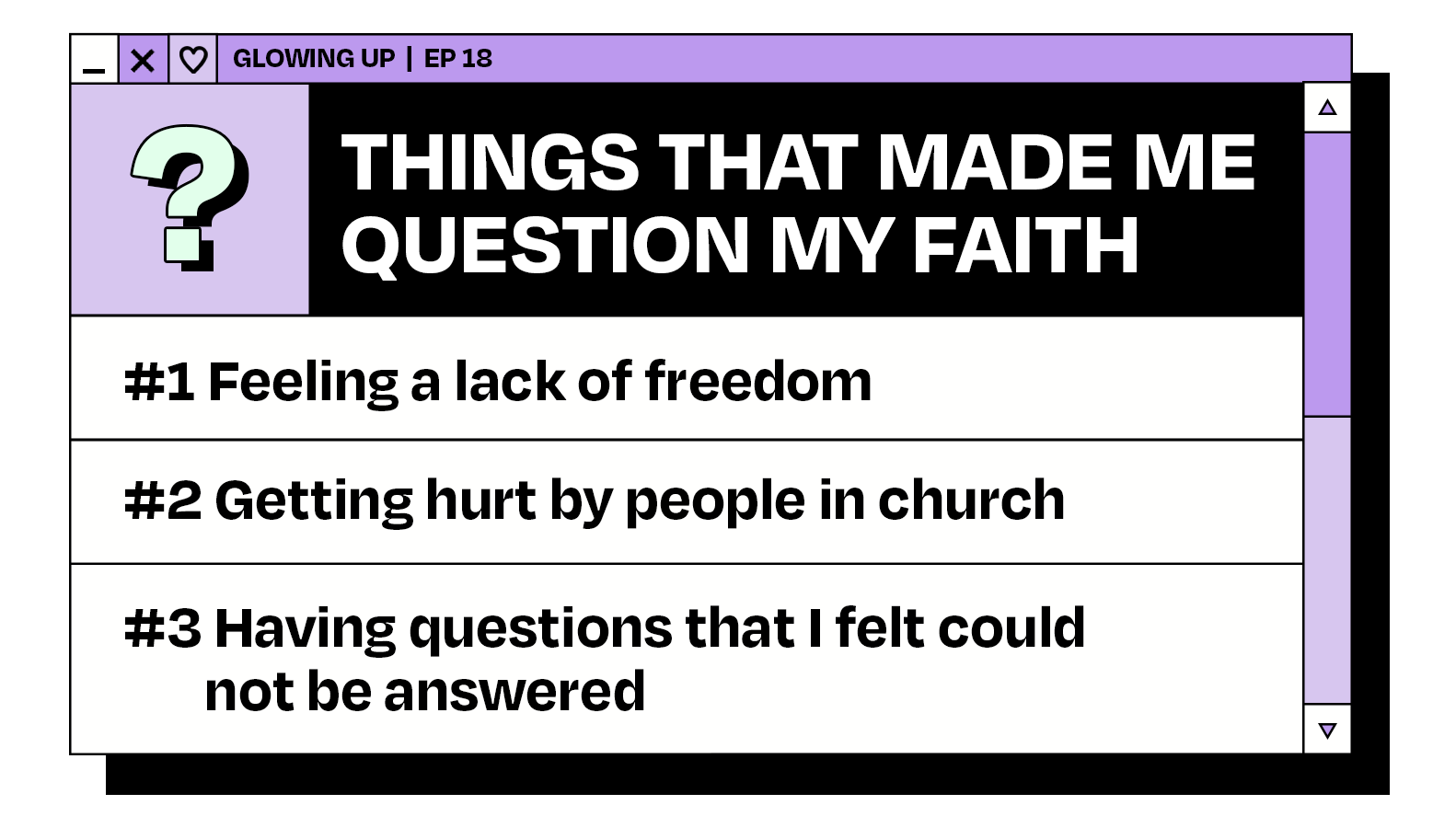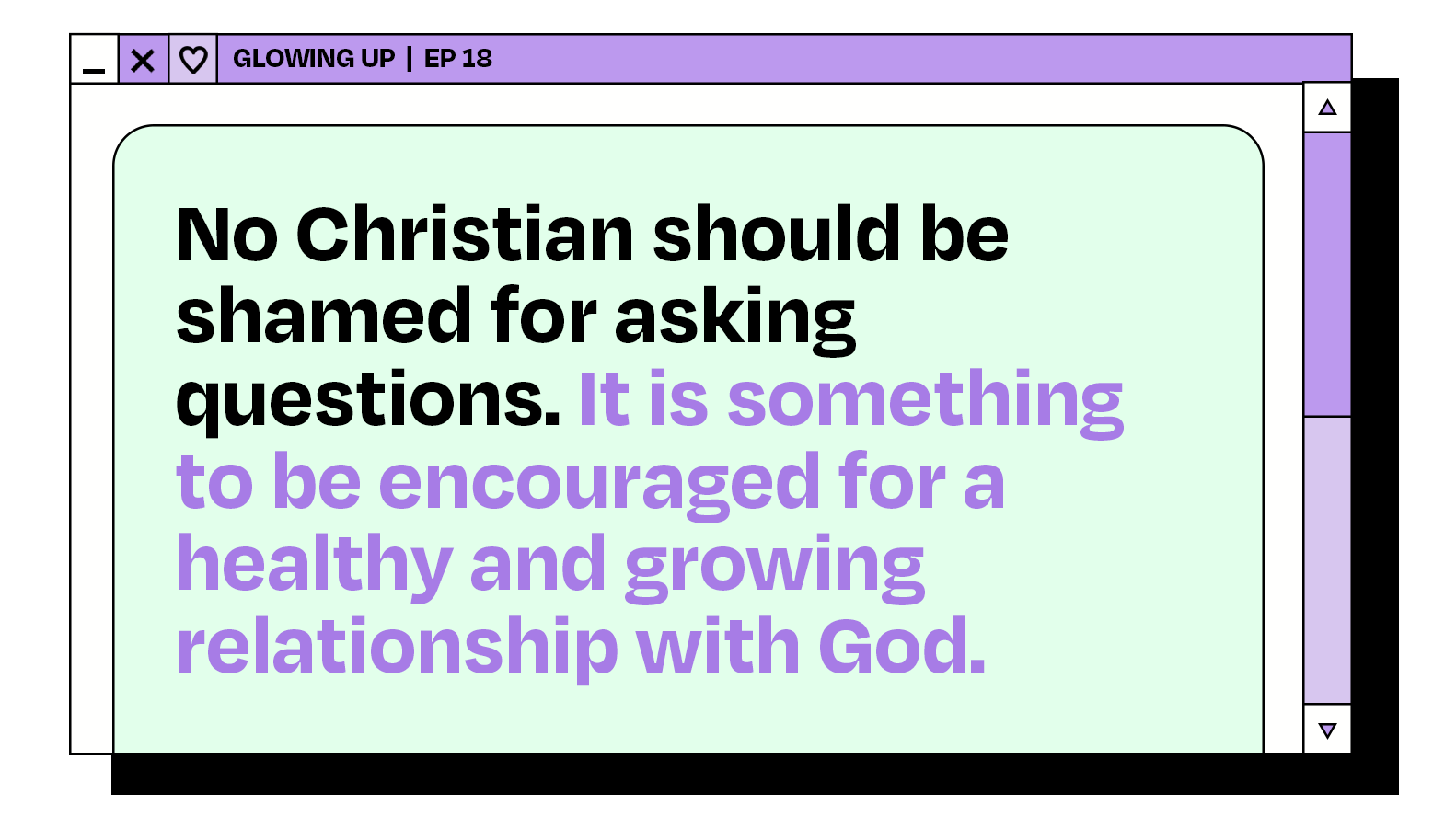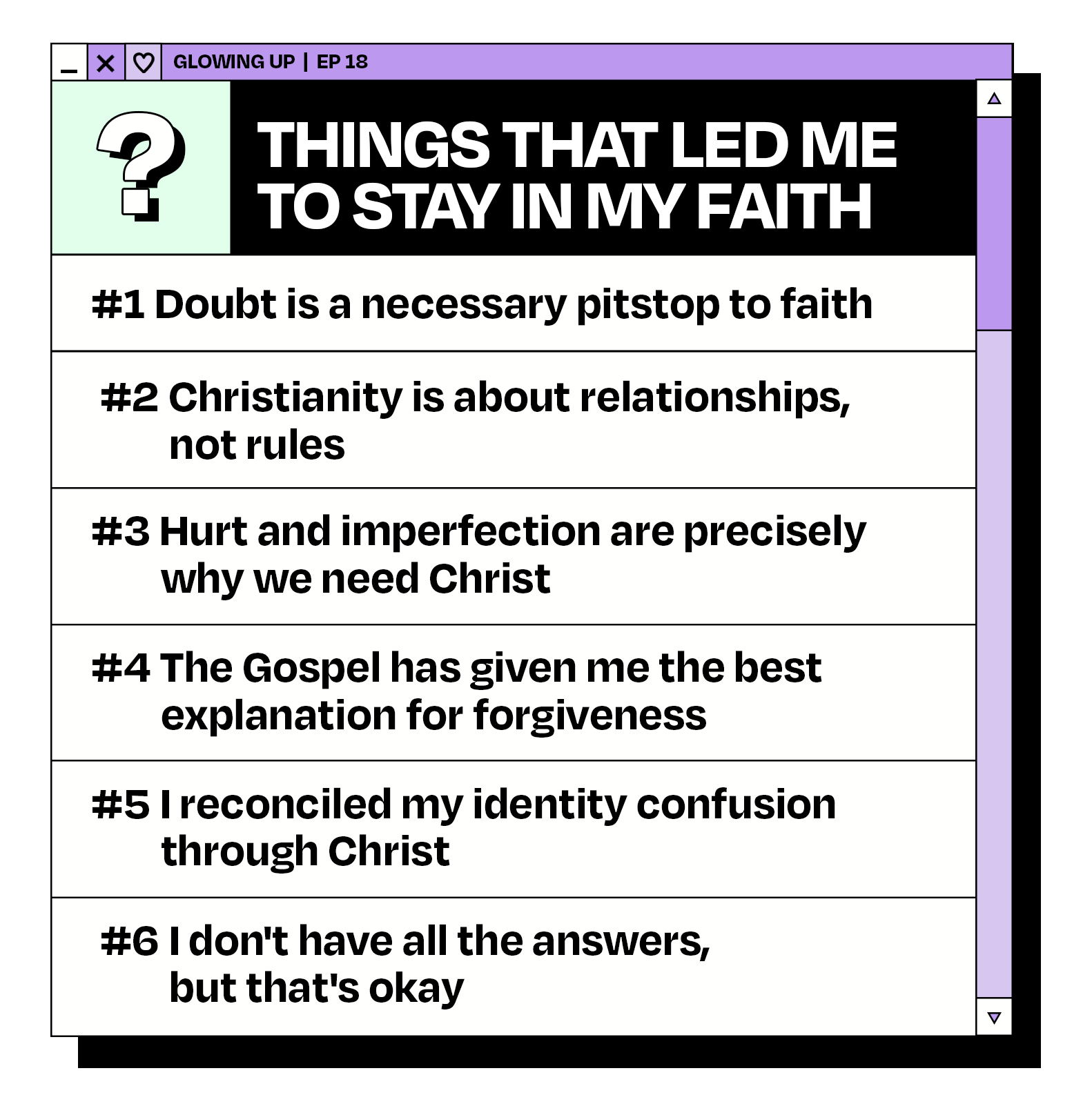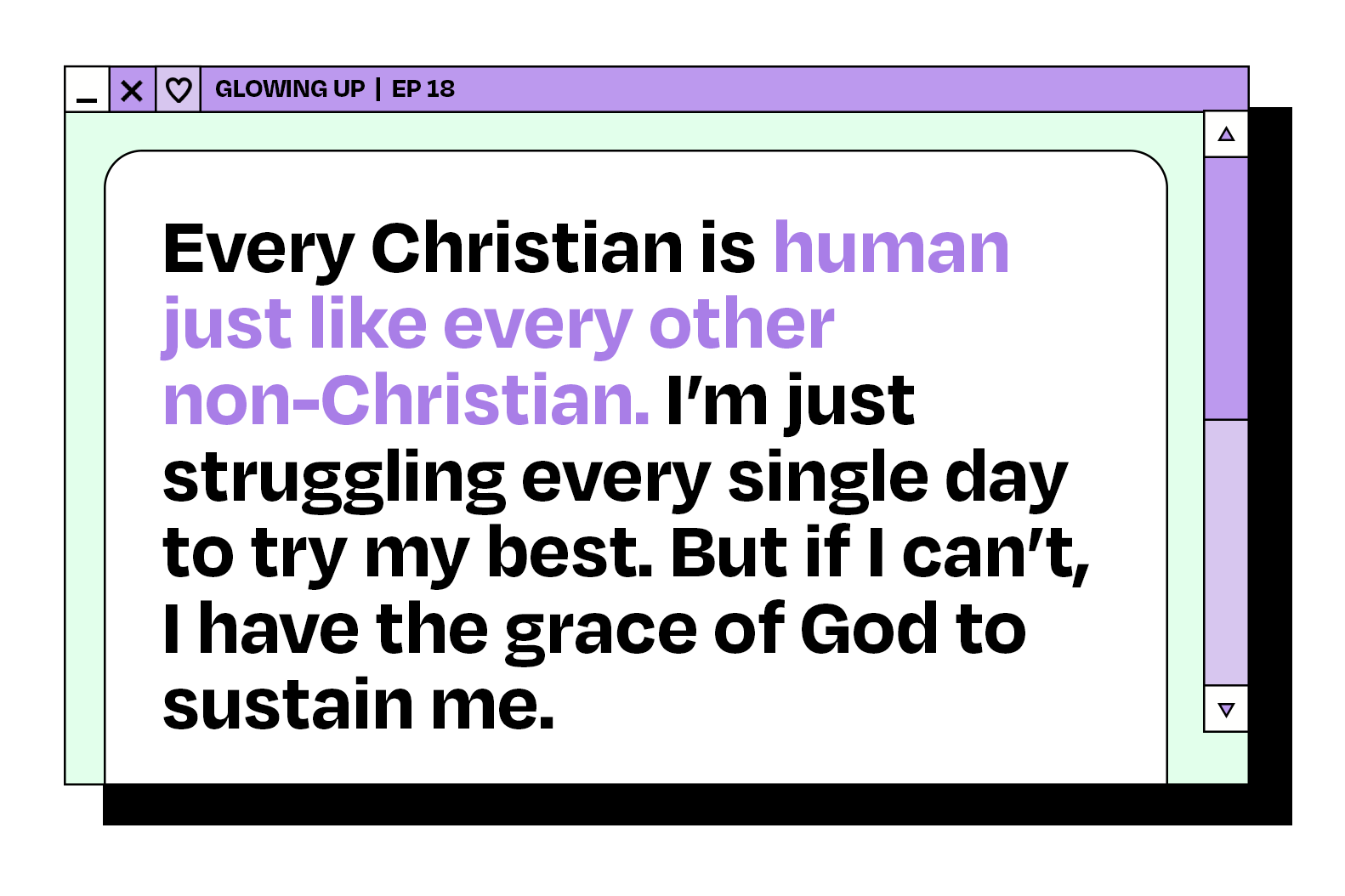In a 22-minute video last weekend, comedian Annette Lee gave her followers a more serious and rare, intimate look into her faith journey.
Episode 18 of her Glowing Up series saw the 30-year-old look back on her experiences of feeling doubt, a lack of freedom, being hurt by others in church, facing unanswered questions — but also all the reasons to stay on and believe in God that she found.
“I’ve watched a lot of videos on YouTube about people either talking about how they converted to Christianity from a life without God, or why they left Christianity,” read the video’s description.
“But I wanted share a lesser told story, i.e. the perspective of someone who was in church since young, who neither had any earth-shattering conversion moment nor left the faith… but still discovered, in little ways, how my life has changed.”
Beginning to question Christianity
Annette revealed that she first stepped was carried into the church as a baby. She was brought to Sunday School by her parents, which, looking back, is something she is “grateful” towards them for.
However, she started having doubts around her late teenage years — a time when a lot of her friends were also leaving the faith.
“I was in a church where you had to do a lot of good things, and you had to serve. I didn’t like that you had to follow all these rules,” she said.
She started to ask if she was following the rules simply because she was being an “obedient kid”, and questioning whether her faith was just a matter of going through the motions and obeying instructions.
Am I thinking for myself? What is freedom? These were some of the questions on Annette’s mind.
Annette then talked about her experience of being hurt in church, something she acknowledged many people have faced at some point of time.
“It’s very sad, I do not wish anyone to be hurt in church,” she began.
She recounted meeting a bully in her church’s youth camp, her first youth church event she attended right after graduating from the ministry for children attending primary schools.
There was only one other person who was Annette’s age in the group, and the bully kept pulling this would-be friend away from Annette, refusing to let them talk to one another or even go to the toilet together.
Finally, on the bus back home from the youth camp, Annette was about to sit at the back of the bus only to barred from doing so by the bully — making her so sad that she cried.

Annette joined a care group in the youth church after that, but things weren’t about to get better.
Indeed, Annette felt that the leader of that care group played favourites with certain members that she liked and “she would hang out with them more”.
“That made me feel a little bit more rejected,” she reflected, also wondering later if she was a “target” because she was very “nerdy” and “uncool” at the time.
Annette shared that memories like these “tainted [her] experience of what it’s gonna be like growing as a young person in church”, a time she noted is already rife with insecurities for most in their formative years.
“You start to think: if these people truly are supposed to believe in God, then why are they so mean to you?”
Having questions that she felt “couldn’t be answered” also proved to be very problematic for Annette.
What if God isn’t real? You can’t see God. What if there’s just not enough evidence?
These were some of the questions and thoughts that had started to form in her mind.
Annette added that a phase of doubt can feel like “a very lonely experience” — especially if one feels like they would be judged for thinking in that way or even leaving the church) — but is actually more common and normal than we may think.

Looking back, Annette is thankful that as an introverted and introspective person, she decided, at the time, to spend even more time investigating Christianity’s claims.
“I’m going to spend even more time right now, just reflecting more, reading more, researching more and just come to my own conclusion,” she said, recounting her thought process.
“Because I felt like… if there is a God, then I can’t possibly be smarter than Him, right? I can’t possibly know better based on what I’m feeling at this point of time.”
So, Annette decided she wasn’t going to leave the faith just because there wasn’t “a good reason to believe”.
Instead, if she was going to leave, she would do so because there was a reason to leave. She was looking for a pull factor, not a push factor.
Going on what she called a “mental pilgrimage”, Annette shared that God eventually revealed a great deal to her.
“As time progressed on and on, all the more I started to see the joy and the peace and the certainty that came with keeping my faith.”

Doubt is a pitstop for faith
“Doubt is actually a very necessary pitstop for faith,” added Annette, as she moved on to the part of the video detailing why she ultimately decided to keep her faith.
“Many people don’t realise that; they judge people for even asking questions but heck no — ask all the questions you want!
“Nobody wants you to believe just because you’re lazy and because you’re not actually thinking… asking questions is the foundation of any relationship out there.
“You cannot have a strong relationship with anyone if you’re not constantly asking questions… Asking questions is how love even develops.”
Questions as the currency for growing a relationship turned out to be the exact dynamic Annette was missing in her own walk with God.
“God created us to have a relationship with us,” she affirmed. “And so, this whole time as a kid, I was just following instructions, obeying whatever was taught to me…
“But the truth is that in order to really have a relationship with Jesus — it’s all about asking questions.”
That is why Annette believes no Christian should be shamed for asking questions, and that it is even something to be encouraged for a healthy and growing relationship with God.
It’s about relationship, not rules
Building on that point, Annette shared a second reflection: Christianity is about relationship and not rules.
“There are some Christians who made it about rules,” she noted. “But if anything, Jesus came to show that these rules just don’t work.”
Sharing how the Bible shows us that not a single person was able to follow the Ten Commandments perfectly, the fact that everyone “fell short” is the very reason we need Jesus.

Annette added that it is important to distinguish between God and His people (who will fall short).
“I also came to realise that a lot of all these very religious people who are very self-righteous, who are always scolding you and judging you in church certainly don’t represent God,” she said.
“And that also includes the people who hurt other people in church. You should never conflate these people, and their imperfections and their shortcomings, with God who’s perfect Himself.”
Hurt and imperfection
Growing up experiencing hurt and imperfections in church, Annette would later find more of the same at school and in the workplace.
“It just dawned on me that [hurt] wasn’t a problem with God, but a problem with any human organisation,” she reflected.
Hurt “just happens” because people are people, said Annette, who acknowledged that she herself is also deeply “flawed” and “completely imperfect” just like everyone else.
She also addressed the cultural expectation or misconception that Christians are so supposed to be perfect: “I think it’s so harmful and just such a weird expectation for people to expect that Christians should be perfect and that once you’re a Christian you should be a perfect person.
“Every Christian is human just like every other non-Christian. And me, being a Christian, I’m just struggling every single day to try my best. But if I can’t, I have the grace of God to sustain me.”
Annette reaffirmed that this is the reason Jesus came: to stand in an imperfect people’s place as a perfect Person and sacrifice before God.
“We’re all broken and we’re all searching for that same healing and that same hope,” she concluded. “And it can only be found in God, because you can’t find your healing and your hope in any other human being who’s gonna disappoint you.”

The Gospel: the best explanation for forgiveness
Annette finds the concept of forgiveness strange, likening it to an equation that has “gone wrong”. Nevertheless, the Christian view of forgiveness is the “top reason” she has stayed on in the faith.
“If somebody gives you two bad apples, in order to equalise it, you have to return them two bad apples. And then everything is back to normal, right? Eye for an eye,” she said.
“But forgiveness, is basically someone giving you two bad apples… and then you give them two good apples. Why would you do that?”
Annette struggled with that idea because she felt she generally wasn’t “as bad” as those who had bullied or wronged her.
Going from that mindset, it was difficult to see why she should forgive others, until it hit her one day that we struggle with forgiveness because “we think that we’re inherently good”.
“There’s a lot of pride in that,” she said. “Like I feel that 80% of me actually didn’t need salvation from Jesus; I didn’t need to be saved since 80% of me is ‘good’.”
But Annette came to see that “sin is sin”, and that you can neither quantify sin nor goodness.
“We are not God,” she said. “We are not the arbiter of who is a good person, who is a bad person because… nobody knows anybody completely. Only God knows you completely.”
I need the same amount of salvation as every other person.
After offering another interesting equation that proved you can’t quantify good or evil, Annette shared that learning to forgive began when she came to see that she is “no better” than the worst murderer, no better than her bullies — no better than anyone she might think is a worse person than her.
“I need the same amount of salvation as every [other] person,” she said. Coming to that conclusion enabled her to truly forgive and proved to be such a “liberating feeling”.
“It’s basically me realising: God is able to forgive this person, and God is the one who’s the arbiter of right and wrong,” she said. “He can forgive this person — why can’t I forgive this person?”
Accepted and special
Annette also spoke on the strange human dichotomy that is wanting to belong and simultaneously wanting to stand out.
To that, she has found that God is “able to satisfy both” sides: Christians are accepted by God through Jesus, and at the same time are also “set apart” with a unique and secure identity as children of God.
For Annette, that is a truth that makes for a “secure” and “peaceful” life. Having been in a “weird space” where she was often trying to discover herself as an artist and find out her identity — she found these needs met in Jesus.

As the video started to draw to a close, Annette encouraged viewers that “sometimes, you don’t really need to have all the answers”.
Sharing an example of how she experienced a miracle in her life, she said that “sometimes all you need are just experiences in which your life has changed”.
Drawing a parallel to the story of the blind man and the Pharisees, Annette summed up her journey as something quite similar: “I don’t know, okay. I don’t know how, I don’t know what — all I know is I once was blind and now I see.”
A different experience, a different voice
Annette began the last segment by explaining she wanted to make the video because she grew up watching a lot of videos on YouTube where people (with journeys often similar to hers) explained why they left the church.
“I realised that people usually share the story when they leave, but they don’t really share the story when they stay,” she said.
“It’s kind of how I made a video of why I left my job, but if I stayed at my job I probably wouldn’t share about it!” she said with a laugh.
As such, she thought she would share her story for those who could relate to it, especially those who grew up in church and may be struggling with the same things she did like doubts, demands and hurts.
… is this something you would believe in even if you were the only person on Earth?
Speaking directly to folks like these, Annette said: “I just want to encourage you to spend some time with your own thoughts and just ask yourself: is this something you would believe in even if you were the only person on Earth?
“If you shut off every other opinion, everything else you’ve read online, everything else you’ve seen, and just studied and tried to discover things on your own, and if people around you weren’t thinking a certain way or treating you a certain way…
“You and God; will you still believe in Him?”
Annette closed by sharing one of her favourite stories from the Bible: when Jesus rose from the dead and cooked fish for His disciples.
In that story, Jesus spoke to Peter about important things, like Peter’s future and things concerning ministry. But Peter was focused on others around him, and he asked Jesus about their fates.
“Jesus said: ‘What is that to you? You follow me!’,” Annette recited. “We spend so much of our time just being concerned with the people whom we like or don’t like in church; whether we they’ve hurt us or they’ve not hurt us…
“And we compare whether their walk with God is better than ours, or worse than ours.. But honestly, I think we should just all stop looking at the people around us.”
What is to you? You follow me. In a world where it’s all too tempting to look elsewhere, those words of Jesus are what give Annette “peace”.
- Which of Annette’s points stirred you most?
- What must you do for a healthy and thriving relationship between you and God?
- Know of anyone who may be struggling the way Annette did in the faith?
- How can you be an encouragement and a blessing to them this week?









